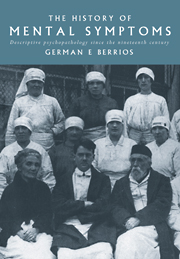Book contents
- Frontmatter
- Contents
- PREFACE
- ACKNOWLEDGEMENTS
- INTRODUCTION
- PART I The object of inquiry
- PART II Cognition and consciousness
- PART III Mood and emotions
- CHAPTER 11 Anxiety and cognate disorders
- CHAPTER 12 Affect and its disorders
- CHAPTER 13 The anhedonias
- PART IV Volition and action
- PART V Miscellany
- REFERENCES
- NAME INDEX
- SUBJECT INDEX
CHAPTER 13 - The anhedonias
from PART III - Mood and emotions
Published online by Cambridge University Press: 08 January 2010
- Frontmatter
- Contents
- PREFACE
- ACKNOWLEDGEMENTS
- INTRODUCTION
- PART I The object of inquiry
- PART II Cognition and consciousness
- PART III Mood and emotions
- CHAPTER 11 Anxiety and cognate disorders
- CHAPTER 12 Affect and its disorders
- CHAPTER 13 The anhedonias
- PART IV Volition and action
- PART V Miscellany
- REFERENCES
- NAME INDEX
- SUBJECT INDEX
Summary
The neologism anhedonie, coined by T. Ribot to name an ‘inability to experience pleasure’, has not yet made it into the most recent French psychiatric dictionary nor does its English version feature in OED. Its concomitant concept has merited both narrow (‘blocking of the reward reinforcement of usually reinforcing stimuli’) and broad formulations (‘loss of interest or pleasure in all or almost all usual activities and pastimes’). The behaviour to which anhedonia refers is not new: indeed, by the time of its coining it had already been reported in patients with ‘melancholia’ who were incapable of ‘feeling joy any more’. The term first took root in the psychoanalytic literature, and in English-speaking psychiatry came into currency after 1979. (The same holds true for France and Germany.) Legitimated by DSM III and recently by ICD-10, anhedonia is now considered as a ‘symptom’ of two important clinical conditions (depression and schizophrenia). More empirical evidence is, however, required to confirm that the clinical phenomena in question are the same in both cases.
Anhedonia is a multivocal term. This partially results from the fact that the concept on which it is grounded is parasitical upon the ever changing definition of pleasure, i.e. of ‘the condition of consciousness or sensation induced by the enjoyment or anticipation of what is felt or viewed as good or desirable; enjoyment, delight, gratification’ (my italics). However, because it is not even known whether ‘there is something fundamental which is common to enjoying something, getting satisfaction out of something, being pleased at something, feeling good and so on’ (my italics). the definition of anhedonia is bound to be multiple and fuzzy.
- Type
- Chapter
- Information
- The History of Mental SymptomsDescriptive Psychopathology since the Nineteenth Century, pp. 332 - 348Publisher: Cambridge University PressPrint publication year: 1996
- 1
- Cited by



